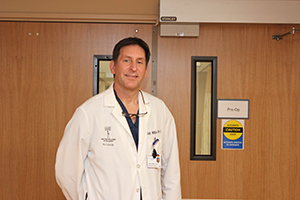A typical weekday turned surreal on August 10, 2020, for Jeff Miller, a physician assistant who has helped care for joint replacement patients at McLaren Flint for 24 years. He worked his day shift at the hospital and then drove home to Lapeer. Nothing was out of the ordinary until shortly after he arrived home. He had some numbness in his right arm and his vision became extremely light sensitive. For years, he has suffered with migraine headaches, and his immediate reaction was that it was just another one. He decided to sit down and see if these symptoms would go away. Instead, his arm became even more numb, and then his right leg felt weak. These escalating symptoms all occurred within 15 to 20 minutes of each other. Jeff was now getting concerned. He got up and tried to walk but was limping, and he couldn’t use his right arm at all. He stumbled into the kitchen.
“I thought I was thinking clearly, but I know I was in denial,” said Jeff. “There was a mirror in the kitchen, and I saw myself. The right side of my face was drooping, I tried to speak, and I couldn’t. I realized I was in trouble but knew my wife should be home soon. Right at that moment, she sent me a text, but I was unable to text her back. I knew I should call for help, but I couldn’t dial the phone. There was this weird disconnect from my brain to being able to do what I wanted.”
Jeff decided if his wife didn’t arrive in the next 15 minutes, he was going to try to stumble to the neighbor’s house. He decided to stand by the back door. Fortunately, his wife Jane did come home at her regular time. When she opened the door and looked at him, he remembers the look of horror on her face. Jane is a registered nurse and has had years of experience with a variety of patients, including those who have had a stroke. She helped Jeff get in her car, and she chose to drive him to McLaren Flint. However, they do not recommend this to others. They know the best practice is to call 911. Within an hour of experiencing his first symptoms, Jeff was at McLaren Flint, but he could no longer follow instructions, and things got fuzzy.
“I recall getting a CT scan of my brain very quickly and the ER staff telling us I had a blockage and not a bleed,” said Jeff. “Dr. Mahmoud Rayes, an interventional neurologist at the hospital, came and talked to me and Jane. Since I couldn’t communicate, she agreed to me receiving the medicine tPA to break down the clot, but that wasn’t the end of my treatment.” Dr. Rayes also talked to Jane about Jeff participating in a research trial the McLaren Stroke Network was chosen to take part in.

“Jeff qualified for the clinical trial called MOST,” said Dr. Rayes. “This study has very strict criteria, and most patients are not eligible to take part. The research is looking at two additional drugs to see if stroke patients do even better with either of them when they are used in conjunction with the standard tPA medication. Patients either get one of the two or a placebo. Patients in the study are evaluated 90 days after receiving the medication or medications to check their health status. I also performed a mechanical thrombectomy on Jeff, which was the removal of the blood clot blocking one of the arteries leading to the left side of his brain. This is done using devices that are threaded up to the brain through a catheter placed in the groin. We are so thrilled with Jeff’s results.”
Jeff remembers being able to speak to Dr. Rayes at the end of his thrombectomy and how excited the staff was to see him talking so soon. He spent six days in the hospital and received a loop recorder, which will monitor his heartbeat.
Since he had no pre-existing conditions, there is nothing to attribute his stroke to. One theory is an undetected irregular heartbeat could have caused it. The loop recorder will pick up anything out of the ordinary should it occur. While an inpatient, testing did reveal Jeff has a patent foramen ovale (PFO). This is a small opening between the two upper chambers of the heart, the right and the left atrium. Normally, a thin membranous wall made up of two connecting flaps separates these chambers so no blood can flow between them. In most people the opening closes before their first birthday. In a small percentage of people this never occurs. Jeff is having this repaired in February, again as a precautionary measure.
“I had some outpatient speech, physical and occupational therapy that began after I returned home last fall, and I was back to work on September 21. I’ve had no issues since,” said Jeff.
Jeff is grateful and thankful for all the care and support he received as a patient.
“I realize how lucky I am,” said Jeff. “My outcome has been nothing but positive. From my wife’s heroic efforts to get me help to the stroke team to every single caregiver and hospital employee who had contact with me, I was impressed. Even my co-worker and close friend Al came all the way back to work to be with Jane that day because our four children are all grown and away from home. I’m happy to talk about the place I work taking such good care of me.”